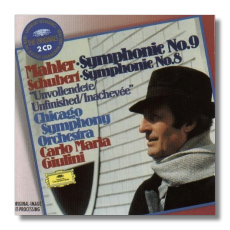
The Internet's Premier Classical Music Source
Related Links
- Latest Reviews
- More Reviews
-
By Composer
-
Collections
DVD & Blu-ray
Books
Concert Reviews
Articles/Interviews
Software
Audio
Search Amazon
Recommended Links
Site News
 CD Review
CD Review
Carlo Maria Giulini Conducts

- Gustav Mahler: Symphony #9
- Franz Schubert: Symphony #8, 'Unfinished'
Chicago Symphony Orchestra/Carlo Maria Giulini
Deutsche Grammophon Originals 463609-2 2CDs 115m ADD
The wonderfully dulcet tones of the Andante comodo set the pace for an expansive performance of the Ninth, almost ten minutes faster than Bruno Walter's classic reading with the VPO in 1938. Giulini's is a beautiful lyrical view as David Gutman espouses in his booklet notes to the set. All works wonderfully well with the burnished Chicago tone magnificent and perfectly honed to an almost trancelike state.
Giulini's view of the Landler is also expansive and unhurried adding an almost noble measure to the proceedings, this is not a grotesque Viennese dance but one that indeed dies with dignity. It is a bit like Barbirolli's brilliant reading with the Berlin Philharmonic Orchestra but that is very fast in certain places clocking in at 77'43 compared with Giulini's 87'55. We come to the hysterical histrionics of the Rondo Burleske, some might call it savage but Giulini seems to tame everything he touches with his exploratory view of the work. The dissonant chords melt into nothingness giving the impression of not wanting to fight anymore, a cruel world left to savage itself away. The Adagio is earthbound but also deeply ethereal in Giulini's pacing, the movement takes 25 minutes but there is no sense of lagging or sluggishness, rather a deep feeling of spiritual grief that transcends all in its unflagging beauty. Giulini certainly joins Karajan (1982, Salzburg/Berlin Philharmonic Orchestra), Barbirolli (1963, Berlin Philharmonic Orchestra) and Walter (1938, VPO) as one of the greatest interpreters of this spiritual testament.
DG couple this reading with the famous 'Unfinished', a late 70's account also with the Chicago Symphony Orchestra. It is a classical reading in the extreme, rather reminiscent of Kertész and his recording with the VPO in 1964 for Decca. The Allegro moderato reveals wonderful detail with chirpy woodwinds and silky smooth strings that thrill the listener to the bone, especially as the movement melts away. In the Andante con moto, Giulini is also very relaxed and calm but at the same time there is a mystical aura to the work that is almost like a Neolithic temple.
The clear recording helps to bring out the different shades of the music very well. Now its about time DG reissued Giulini's similary wonderful account of the 'Tragic' symphony which we can compare with Markevitch's fabled mid 50's mono version with the Berlin Philharmonic Orchestra. To round up, this double album will always have a place on any Mahlerian shelf and the wonderful Schubert is indeed a superb bonus.
Copyright © 2001, Gerald Fenech


















